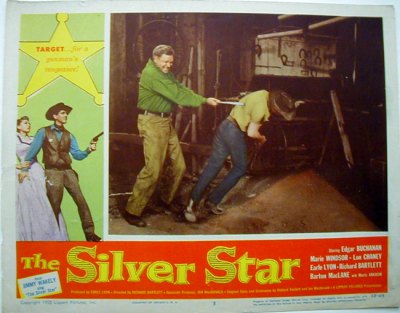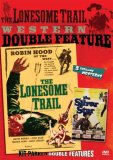| Reviews & Columns |
|
Reviews DVD TV on DVD Blu-ray 4K UHD International DVDs In Theaters Reviews by Studio Video Games Features Collector Series DVDs Easter Egg Database Interviews DVD Talk Radio Feature Articles Columns Anime Talk DVD Savant Horror DVDs The M.O.D. Squad Art House HD Talk Silent DVD
|
DVD Talk Forum |
|
|
| Resources |
|
DVD Price Search Customer Service #'s RCE Info Links |
|
Columns
|
|
|
Western Double Feature - The Lonesome Trail & The Silver Star
Both were made by L&B Productions, a low, low-budget indie company formed by actor-producers Earle Lyon and Richard Bartlett. Lyon has the leading role in The Silver Star while Bartlett plays the main henchman in both films. Yet another actor, Ian McDonald, who has a prominent role in The Lonesome Trail, co-wrote both films and is credited as Associate Producer. Neither film looks like it cost more than $100,000 to make.
Another oddity of these nearly homegrown productions is their screwy billing. Though Lyon plays the leading part in The Silver Star, he's billed fourth after Edgar Buchanan, Lon Chaney, and Marie Windsor. Buchanan was a popular character actor but hardly star material yet deemed the biggest box office draw, probably because he had recently been Hopalong Cassidy's sidekick on that phenomenally popular TV series a few years before. Nevertheless, the sloppy title designer managed not only to misspell Buchanan's name (as Edgar Buchanon) but also that of veteran character actor Barton MacLane (as Barton McLane) in both the main and closing credits.
In The Lonesome Trail, John Agar plays the main part but top-billing absurdly goes to Wayne Morris, "the last of the B-Western stars" better remembered today for his ironic casting as the weak-willed soldier in Stanley Kubrick's Paths of Glory (1957). Where Agar is in almost every scene, Morris has a tiny role playing a bartender, which would be like giving Glenn Strange top-billing on Gunsmoke over James Arness. Morris probably doesn't have more than 10 lines in the entire picture.
The film has a neat gimmick badly executed. Agar plays Johnny Rush, a half-breed former Indian fighter who returns home to find that he and his and his neighbors are being run off their land by Hal Brecker (Earle Lyon), including stereotyped toothless mountain man Charlie (Douglas Fowley, very over-the-top). One neighbor, wheelchair-bound Dan Wells (Edgar Buchanan), whose daughter, Pat (Margia Dean, of The Quatermass Xperiment), is in love with Johnny, has made a deal with Brecker to keep his land in exchange for his daughter's hand.
When Johnny is shot in the shoulder by Brecker's main henchman, Baker (director Bartlett), Johnny learns to shoot a bow and arrow under the tutelage of Charlie and old Apache Gonaga (Ian McDonald, very unconvincing).
There's a germ of a good Western suggested by the film's advertising but which is squandered in the hum-drum script. Posters for the film, hailing Johnny as a "Robin Hood of the West," enticingly promise that the injured Johnny turns to the bow and arrow to mete out justice, possibly a unique idea in Westerns. Unfortunately, most of the film's running time has Johnny unconvinced that the thousands-year-old weapon will do any good, complaining he looks silly trying to use it. He doesn't even shoot an arrow at anybody until the film is almost over.
Filmed on a limited number of sets with an even more limited variety of camera set-ups, The Lonesome Trail looks awfully cheap and director Bartlett proves a far better actor than a director. The blocking is at times eccentric, to put it kindly, with actors often delivering their lines with their backs to the camera, and so forth. The performances are highly variable. Agar isn't bad, and Buchanan was already such a veteran of such films that he's fine in a clichéd role, but everyone else is either too broad (Fowley) or completely inadequate (Dean and McDonald).
Most of the film's 73-minute running time has Gregg bellyaching about how useless the townspeople are in a fight (despite evidence to the contrary), and Gregg's efforts to leave town once King Daniels (director Bartlett again), a mysterious, vicious gunman, rides into town with two henchman determined to kill Gregg. This, of course, is something of a flip-flop of High Noon (1952), in which Gary Cooper's sheriff is determined to stay in town and raise a posse, only to find that most of the townspeople for one reason or another refuse to help him. Maybe the filmmakers thought they were being clever by offering some sort of counterpoint to High Noon's controversial cynicism, an approach capitalized much more successfully by Howard Hawks a few years later for Rio Bravo (1959), but here Gregg simply comes off as a whiny wimp.
The good supporting cast includes Lon Chaney, Jr. as a suave attorney (Lon Chaney a suave attorney?!) and Barton MacLane as a burly blacksmith. They probably should have switched roles, though Lon's in there swinging. Marie Windsor has an almost completely thankless role as Gregg's love interest while Morris Ankrum plays her bartender father. (The actor has his arm in a sling and it may really have been broken.)
Video & Audio
At 1.77:1 in enhanced transfers that approximate their original 1.85:1 releases, The Lonesome Trail and The Silver Star are framed more or less correctly but neither looks as good as one might expect, with both looking grainy, dark and washed out for reasons unknown. The former has a lot of day-for-night shots, but all the exteriors seem too dark to this reviewer; The Silver Star is marginally better. Other full frame releases of similar vintage, for example Universal's Sci-Fi Collection or CasaNegra's '50s Mexican horror films, look better zoomed in on widescreen TVs than this does enhanced. Still, given the film's distribution history both probably look as good as they're ever going to. The dual-layered DVD-9 is all-region with no subtitle or alternate audio options.
Extra Features
Supplements include a short, four-minute interview with producer-actor Earle Lyon, who talks about the two pictures in general terms, while reminding viewers just how many heavy drinkers were on these films (Morris, Agar, Chaney, etc.) and tells an amusing anecdote about Buchanan's lifelong interest in dentistry.
Also included are pretty good text biographies of Morris, Agar, Buchanan, Chaney, Bartlett, and Lyon, and trailers for five other Kit Parker releases, though none for The Lonesome Trail nor The Silver Star. There is, however, an excellent Advertising & Stills Gallery, full of lobby cards, 8 x 10s, and pressbook images and text.
Parting Thoughts
Fans of second-rate movies will find this double-bill fun but decidedly mediocre, and the film elements this time out aren't up to Kit Parker's usual high standards. The price is right but many consumers may still want to Rent It.
Film historian Stuart Galbraith IV's most recent essays appear in Criterion's new three-disc Seven Samurai DVD and BCI Eclipse's The Quiet Duel.
|
| Popular Reviews |
| Sponsored Links |
|
|
| Sponsored Links |
|
|
| Release List | Reviews | Shop | Newsletter | Forum | DVD Giveaways | Blu-Ray | Advertise |
|
Copyright 2024 DVDTalk.com All Rights Reserved. Legal Info, Privacy Policy, Terms of Use,
Manage Preferences,
Your Privacy Choices | |||||||















